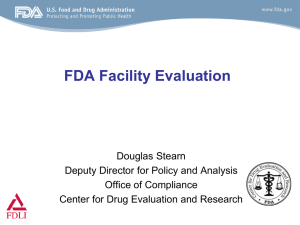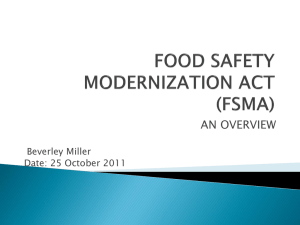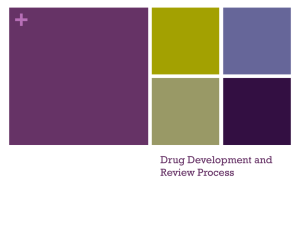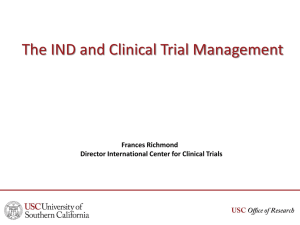U.S. FDA Food Safety Modernization Act
advertisement
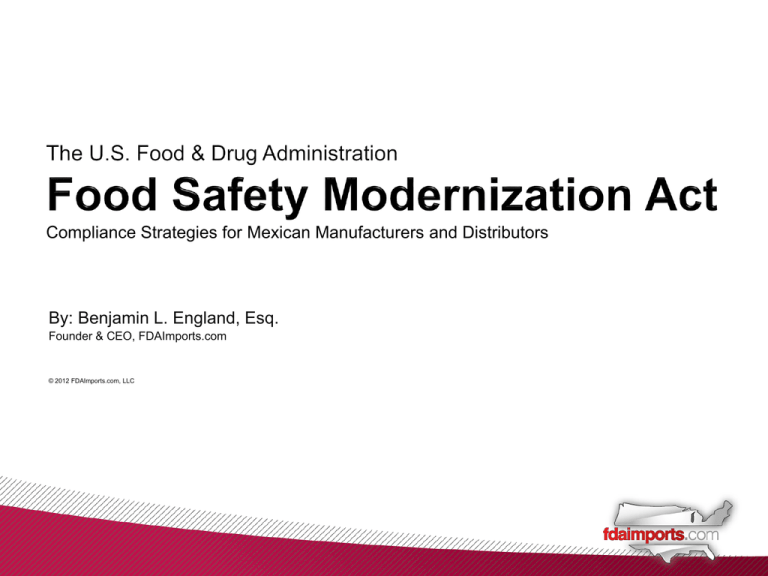
Compliance Strategies for Mexican Manufacturers and Distributors By: Benjamin L. England, Esq. Founder & CEO, FDAImports.com © 2012 FDAImports.com, LLC • • • • • • • • Basics of the FSMA Food Industry Generally Importers and Imported Food Other FSMA Information FSMA Hidden Challenges Fees and Costs Conclusions Questions & Workshop Time FDAImports.com, LLC ©2012 • Enacted: January 4, 2011 • Applicability Specifically affects “food” Beverages, dietary supplements, fresh produce, alcoholic beverages, seafood, dry goods, finished and ingredients • Did not include funding – U.S. has not passed a federal budget for three years • U.S. Congress is more likely to fund eventually FDAImports.com, LLC ©2012 • • • • • • • Hazard Analysis & Risk Preventive Controls Standards for Produce Safety Facility Inspections Mandatory Recall Authority Facility Registrations Record Inspection & Maintenance Import/Foreign Industry Provisions FDAImports.com, LLC ©2012 Similar to FDA’s Seafood HACCP regulations Requirements: • Conduct hazard analysis, develop and implement preventive controls, and monitor the control’s effectiveness • Develop a written plan for controlling hazards • Reanalyze for potential hazards at least every three years • Verify the effectiveness of the controls • Maintain records of the verification process FDAImports.com, LLC ©2012 Facilities Exempt from HARPC Requirement: • Facilities subject to Standards of Produce Safety • Facilities subject to the HACCP requirement and lowacid canned food standards • Facilities subject to dietary supplement cGMPs Most facilities will not be exempt from HARPC FSMA required FDA to propose regulations by July 4, 2012 (unless small or very small business) Missed Deadline! FDAImports.com, LLC ©2012 • FDA to work with USDA to establish standards for safely producing and harvesting raw agricultural products • Prioritize for agricultural commodities that have been associated with food borne illnesses in the past FDAImports.com, LLC ©2012 Exemptions: • Facilities subject to HARPC requirements • Directly from farm to – Consumers, or Restaurant or retail food establishments (in the same state or within 275 miles) Extra time to comply allotted to: • Small businesses (given 1 extra year) • Very small businesses (given 2 extra years) FSMA required FDA to propose regulations by January 4, 2012 Missed Deadline! FDAImports.com, LLC ©2012 Domestic Food Facilities • High Risk Facilities: Once by January 2016 (then every three years) • Non-High Risk Facilities: Once by January 2018 (then every five years) Foreign Food Facilities • 600 inspections by January 4, 2012 • 19,200 inspections by January 4, 2017 • FDA can consider requiring records be submitted for review instead of an inspection FDAImports.com, LLC ©2012 FDA Burden • Reasonable probability the food is adulterated or misbranded by failing to disclose major food allergens • Reasonable probability the food will cause serious adverse health consequences or death FDAImports.com, LLC ©2012 Process 1. FDA provides responsible party opportunity to cease distribution and recall food 2. FDA requires immediate stop on food’s distribution 3. Following an informal hearing, FDA may recall the food or vacate and cease distribution Responsible party pays for all FDA recall activity expenses FDAImports.com, LLC ©2012 Biennial registration requirements: Now every 2 years instead of “once for all time” (Must re-register by Dec. 31) Additional information required with registration: New Mandatory Food Categories FDA Authority • To revoke registration • Require declaration of more information in registration FDAImports.com, LLC ©2012 FSMA requires new food categories in facility registration (38 + new categories) Previous mandatory/optional category declarations no longer apply Getting this wrong could lead to invalid registration, suspension of facility FDAImports.com, LLC ©2012 Two ways for FDA to require Records production: • Adulterated food • Use of or exposure to food Both routes allow FDA greater access to records • Access to the food “and any other…[food] affected in a similar manner” • Very broad authority to demand/obtain records FDAImports.com, LLC ©2012 FDA has authority to require additional record keeping for “High-Risk Foods” (more than just records relating to receipt or delivery of food) • FSMA required FDA to designate “high-risk foods” by January 4, 2012 Missed Deadline! • FSMA requires FDA to propose regulations by January 4, 2013 FDAImports.com, LLC ©2012 • • • • Foreign Supplier Verification Program Qualified Importer Program Inspection/Examination Fees Other Information FDAImports.com, LLC ©2012 Every importer must establish a plan that verifies: • • That the foreign supplier complies with HARPC or Standards for Produce Safety That the food is not adulterated or misbranded by failing to disclose major food allergens Importer must maintain records for no less than 2 years Noncompliance is grounds for refusal of an imported article (Beginning Jan 4, 2013 – or when regulations issued) Grounds for criminal enforcement FDAImports.com, LLC ©2012 Exemptions: Facilities required to comply, and are in compliance, with Seafood HACCP requirements Juice HACCP requirements or Low-acid food package standards FSMA requires FDA to propose regulations by January 4, 2013 FDAImports.com, LLC ©2012 • FDA must establish voluntary program in order to expedite importation of safe and secure food. • Eligibility is determined by overall safety of food offered for import by the specific importer. • Importers must obtain certification by third-party auditors (designated by FDA) FDAImports.com, LLC ©2012 • FDA to review importers eligibility no less than once every three years. • FSMA required FDA to propose regulations by January 4, 2012 Missed Deadline! FDAImports.com, LLC ©2012 Importation Certificates • Grants FDA authority to require certification for certain foods based on risks associated with either The food or The country of origin of the food Prior Notice • Prior to importation, importers must notify FDA if any country has refused admission of the food • Effective Date: July 3, 2011 FDAImports.com, LLC ©2012 FDAImports.com, LLC ©2012 • Be ready for HARPC requirements • Watch how FDA talks about “High-Risk” foods • Be ready for inspections… Even if they never come • Re-register your facility NOW (Once the FDA website lets you) • Convert your records to something FDA can read/understand FDAImports.com, LLC ©2012 FDAImports.com, LLC ©2012 • FSMA provisions that appear as if they are not important (and most people are not talking about them) • The FSMA language is vague and imprecise • FSMA provisions that are ignored in the overall context of FDCA, the law that is being amended FDAImports.com, LLC ©2012 FSMA Federal Food, Drug, and Cosmetic Act (FD&C Act) FDAImports.com, LLC ©2012 When viewed in context, just 1 set of rules Refusal Authority If it “appears” from the examination of samples “or otherwise” that: (1) Article manufactured, processed, packed under insanitary conditions (2) Article forbidden or restricted in sale in the country in which it was produced or from which it was exported (3) Article adulterated, misbranded or unapproved (4) Article is a High Risk food subject to record keeping (and doesn’t comply) (5) Article is a food subject to certification (doesn’t comply) (6) Article is a supplement subject to adverse event reports (and doesn’t comply) FDAImports.com, LLC ©2012 FDA Refusal Authorities (Cont.) Refusal Authority If it “appears” from the examination of samples “or otherwise” that: • Any of the previously enumerated conditions exist… Then such article shall be refused admission Refused goods shall be destroyed unless exported Plus: - No Prior Notice – Refusal (can be cured) - No Registration – Refusal (can be cured) - Importer is debarred person (can be cured) - Foreign facility unreasonably denies/delays inspection - Importer in violation of FSVP (eff. 01/04/2013) FDAImports.com, LLC ©2012 What FSMA Says: “In the interest of national security…The Secretary shall— (A) conduct a vulnerability assessment of the food system, including by consideration of the Department of Homeland Security biological, chemical, radiological, or other terrorism risk assessments; (B) consider the best available understanding of uncertainties, risks, costs, and benefits associated with guarding against intentional adulteration of food at vulnerable points; and (C) determine the types of science-based mitigation strategies or measures that are necessary to protect against the intentional adulteration of food.” – FDCA 420(a)(2) (21 USC 350i(a)(2)), others What It Means: This will have significant impact on much of the food trade FDAImports.com, LLC ©2012 FDA to work with DHS (and consult with USDA) to issue regulations to “protect against intentional adulteration of food” • Specify mitigation strategies you must implement • How to assess required mitigation strategies • Only applies to food with a high risk that intentional adulteration would result in serious adverse health consequences or death Time Frames FSMA required FDA to propose Guidance by Jan 4, 2012 and Regulations by July 4, 2012 Missed Deadlines! FDAImports.com, LLC ©2012 What it says: ”…each importer shall perform risk-based “foreign supplier” verification activities for the purpose of verifying that the food imported by the importer or agent of an importer is— (A) produced in compliance with the requirements [HARPC] of section 418 or section 419 [Standards for Produce Safety], as appropriate; and (B) is not adulterated under section 402 or misbranded under section 403(w)[allergen labeling].” - FDCA 805(a)(1) (21 USC 384a(a)(1)) FDAImports.com, LLC ©2012 FSMA does not define a “foreign supplier” • Exporter? • Manufacturer? • Foreign warehouse/shipper? • Everyone/Anyone in the supply chain? Time Frames FSMA required FDA to propose Guidance by Jan. 4, 2012 and Regulations by Jan 4, 2012 Missed Deadlines! Takes effect Jan. 4, 2013 (regardless if FDA issues regulations or not) FDAImports.com, LLC ©2012 What it says: “…each importer shall perform risk-based foreign supplier verification activities for the purpose of verifying that the food imported by the importer or agent of an importer is— ‘‘(A) produced in compliance with the requirements of section 418 [HARPC] or section 419 [Standards for Produce Safety], as appropriate; and ‘‘(B) is not adulterated under section 402 or misbranded under section 403(w).” - FDCA 805(a)(1) (21 USC 384a(a)(1)) What it means: FSMA assumes (incorrectly) that international trade in food is “bilateral” and that the U.S. Importer has a direct relationship with foreign processors. FDAImports.com, LLC ©2012 Impact: • Putting the burden on importer • Exporting the U.S. Safety System • FDA delays in implementation for so long that eventually suppliers look for and find other markets Time Frames FSMA required FDA to propose Guidance by Jan. 4, 2012 and Regulations by Jan 4, 2012 Missed Deadlines! Takes effect Jan. 4, 2013 (regardless if FDA issues regulations or not) FDAImports.com, LLC ©2012 What it says: ‘‘The owner, operator, or agent in charge of a facility shall (1) identify and evaluate known or reasonably foreseeable hazards that may be associated with the facility, including (A) [bio][chem][phys][radiol] hazards, natural toxins, pesticides, drug residues, decomposition, parasites, allergens, and unapproved or color additives; and (B) hazards that occur naturally , or may be unintentionally introduced ; and (2) Identify and evaluate hazards that may be intentionally introduced, including by acts of terrorism; and (3) Develop a written analysis of the hazards • Develop PREVENTIVE CONTROLS - new FDCA 418(b)&(c) (21 USC 350g(b)&(c)) FDAImports.com, LLC ©2012 This Language is REPLICATED in 419 (Standards for Produce Safety) What it means: Among others, notice there is no limiting language on the intentional adulteration language like there is in the bioterrorism language FDA must coordinate with DHS FDAImports.com, LLC ©2012 Impact • Like food GMPs and HACCP, FDA will write general regulations. Problem will be deciding what are the hazards. • HARPC includes unintentional and intentional adulteration hazards – and FDA knows even less about intentional adulteration risks Time Frames • FSMA required FDA to propose regulations by July 4, 2012 Missed Deadline! How you should prepare: • C-TPAT – get involved • Review current FDA guidances regarding mitigating intentional contamination risks FDAImports.com, LLC ©2012 Political Realities: Most likely nothing until after the election • Will the regulations be overdone or underdone? How to plan • Investigate current guidances and programs you can get involved with • HARPC is probably drafted similarly to how the regulation would be drafted • Intentional Adulteration Language – C-TPAT and similar programs can help with this requirement • Be prepared for importer to start asking you for more information to prove compliance with HARPC and Fresh Produce Standards FDAImports.com, LLC ©2012 • FDA has new authority to charge fees to importers if the agency must reinspect previously inspected, imported food • FDA’s first attempt: Covered activities things that could not be considered inspections or examinations • Automatically detained shipments • Commercial document and private laboratory reviews • Submissions of Import Alert Petitions • FY 2013 update – FDA “shelved” its proposal; recently met with industry representatives about how to implement this • The burden on small businesses, majority of importers and foreign suppliers FDAImports.com, LLC ©2012 • FDA has new authority to charge fees to foreign or domestic facilities if the agency must reinspect within 12 months • Statute enables FDA to send bill for Reinspection Fees due from foreign facilities or the U.S. Agent!! • Fees that are due treated like a claim of the Government FDAImports.com, LLC ©2012 FDAImports.com, LLC ©2012 • • • • • • • Basics of the FSMA Food Industry Generally Importers and Imported Food Other FSMA Information FSMA Hidden Challenges Fees and Costs Conclusions FDAImports.com, LLC ©2012 FDAIMPORTS.COM 810 Landmark Drive Suite 126 Glen Burnie, MD 21061 410-220-2800 (Phone) 443-583-1464 (Fax) info@fdaimports.com www.fdaimports.com Baltimore • Irvine • Richmond • Qingdao • London • Sydney • Toronto • Mexico City • Chennai FDAImports.com, LLC ©2012


